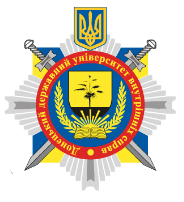Peer-review process
1. MANDATORY REVIEWING PROCEDURE is carried out for all articles submitted to the Editorial Board of the collection of scientific papers “Law Journal of Donbass” in order to comply with the principles of academic integrity, ethical standards, accepted by the international scientific community, and to PREVENT ANY VIOLATION of these principles and norms in the process of scientific publications.
2. Scientific articles submitted to the Editorial Board, which meet the formal criteria, are reviewed for relevance to the SUBJECT MATTER the journal at the session of the Editorial Board in order to determine the range of reviewers. Reviewing articles relevant to the journal is completely anonymous for the author and the reviewer (double-blind review: neither the authors’ nor peer reviewers’ identities are shared with each other).
3. Members of the Editorial Board are INVOLVED in the process of peer review, because they determine the profile, relevance of the topic and have publications in relevant subject areas. The head and members of the Editorial Board are responsible for organizing the peer review of articles and the observance of academic integrity.
4. REVIEWER ESTIMATES:
- sufficiency of disclosing the relevance of the article;
- substantiation of the connection of the problem posed in the article with important scientific or practical tasks;
- completeness of the analysis of the latest researches and publications on the general problem;
- compliance of the objectives of the article with the problem that the author considers;
- substantiation of the received scientific results;
- scientific conclusions and their compliance with the objective of the article;
- prospects for further research in this area.
The reviewer also evaluates the terminological unambiguity of the article; the author’s competence of scientific literature on the discussed range of problems, including international experience; features of the style and language of the author of the article (clarity of language and style, the need for additional scientific and literary editing, etc.).
5. The peer review should contain SPECIFIC CONCLUSIONS regarding the publication, indicating the main deficiencies of the article (if any), as well as a conclusion on the possibility of publication: “recommended”, “recommended taking into account the elimination of mentioned deficiencies” or “not recommended”.
6. The peer review is issued in printed and electronic versions, the printed version must be signed by the reviewer and certified by the stamp of the institution at the workplace of the reviewer, and the electronic version of the review is submitted without a signature to ensure the anonymity of the reviewer’s identity.
7. In case of rejection of the article, the Editorial Board sends a reasoned refusal to the author.
8. Review period from 1 week to 1 month.
9. The positive peer review is not a probable cause for the publication of the article. THE FINAL DECISION on publication is made by the Editorial Board of the journal.
Approved by the Editorial Board
14.03.2018





